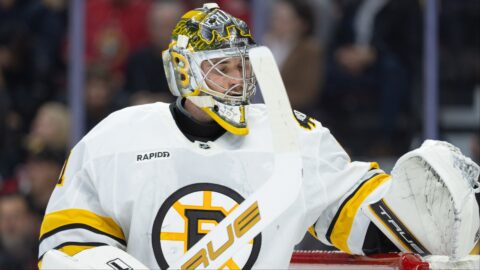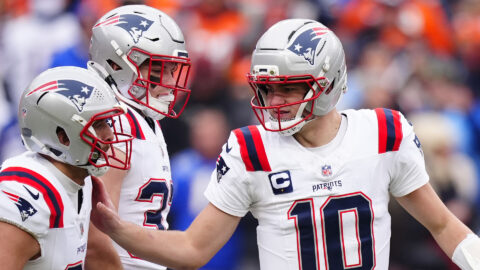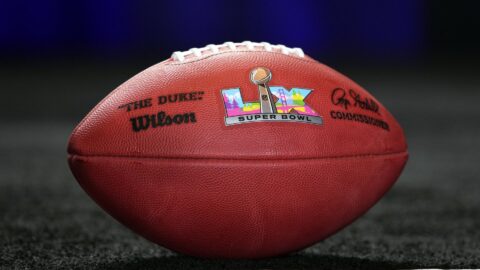All this talk about Boston’s Biggest Sports Legends has us thinking.
A lot goes into producing a champion, something Boston has had quite a bit of experience with the past several years. But it’s not all about the big names — the Tom Brady’s, David Ortiz’s and Paul Pierce’s. There are plenty of people, both wearing the uniform and behind the scenes, who play just as big a part in bringing about a big victory as the person who gets the big hit or throws the winning touchdown.
A lot of the time, those people don’t get thanked. They get overshadowed by the headliners and fade into oblivion, never to be heard from again (or, in some cases, they are assumed to be dead. See below for more on that).
Those people may not qualify as some of the biggest sports legend in the city of Boston, but they are certainly unsung legends.
Here’s our top 10.
The 1984 Michael Jackson Victory Tour
It’s a long-winded complicated story, but it’s true. Without the late king of pop, the Patriots may never have been owned by Robert Kraft — and who knows whether they’d have their three Super Bowl rings? In the early 1980s, current owner Kraft bought purchase rights to the land surrounding the Patriots’ stadium in Foxboro. The then-owners of the team, the Sullivan family, also owned the stadium but not the surrounding land. In 1986, the Sullivans decided to keep the stadium but put up the team for sale, so Kraft held off, yielding to Victor Kiam.
In 1988, the Sullivans were forced to sell the team because of a failed business venture with the Jacksons. The stadium was supposed to be used as collateral to fund Jackson’s Victory Tour, but Sullivan went bankrupt and had to sell the stadium. In stepped Kraft, who bought the stadium for $25 million and later bought out Kiam for the team as well.
Darnell McDonald
So he’s a relatively new addition to the Red Sox, and maybe his impact from here on out will be completely insignificant. But one thing is for sure: Everyone loves a feel-good story. And in Boston’s time of need, D-McD came through, already solidifying himself as the cult hero of the Red Sox in 2010.
With Boston’s outfield ravaged by injuries and no return in sight for Mike Cameron or Jacoby Ellsbury, McDonald — a 12-year veteran of the minors — was called up from Triple-A on April 20 after being told the Red Sox may need him for that evening’s game against Texas. He arrived at the clubhouse 90 minutes before first pitch and got his first shot in the eighth inning with Boston trailing by two. Not only did he tie the game with a pinch-hit, two-run bomb, but he won the game in his next at-bat in the bottom of the ninth with a two-out, walk-off single.
In the most disappointing April the Red Sox had in 14 years, McDonald represented one of very few bright spots. Plus, it’s always nice to know you’ve got a pinch hitter with ice in his veins waiting in the wings.
Kevin Millar
In three seasons with the Red Sox from 2003 to 2005, Millar batted .282 with a combined 52 homers and 220 RBIs — a decent stat line, but that was not where his value was. Millar, commissioner of Cowboy Up, has come to symbolize the new-age Red Sox — the ones who can win instead of the ones who are cursed for eternity.
Millar revitalized a fading franchise beginning in 2003, infecting the clubhouse and the region with his enthusiasm and delightful lack of a filter. With Millar taking the reins, the Red Sox became fun-loving winners instead of perpetual losers. Millar, in fact, was so beloved by the franchise that he was invited back to Fenway Park to throw out the first pitch of Game 7 of the ALCS against Cleveland in 2007 — while he was still technically a member of the Orioles. He became the first active divisional opponent to throw out a first pitch at Fenway.
And on a more serious note, shortly after declaring “Don’t let us win tonight” to anyone that would listen, Millar did draw the walk in the ninth inning of a certain ALCS Game 4 that began the Greatest Professional Sports Comeback of All-Time.
Mariano Rivera
He will doubtlessly go down as one of the best — if not the best — closer in the game, but his midlife career crisis came at the perfect time for the Red Sox. Even before the 2004 ALCS, Mo had his share of difficulties when facing the Red Sox — he coughed up a walk-off bomb to Bill Mueller on July 24 of that year, giving the Red Sox the victory that would come to be known as their turning point — but the difficulties he had in the ALCS were particularly instrumental in helping the Red Sox earn their first World Series in 86 years.
In Game 4, the Red Sox were down 4-3 with Rivera on the mound. Millar walked, Dave Roberts pinch-ran and stole second, Mueller’s single scored him and the game was tied. We all know how that ended. Then, in Game 5, the Yanks were up by the same score in the bottom of the eighth when Rivera replaced Tom Gordon and promptly allowed a sac fly to Jason Varitek, which scored Roberts and tied the game.
A couple of nights later, Boston pulled off the series win after being in a 3-0 hole. And fans thanked Mo very enthusiastically at the beginning of the next season, giving him a standing ovation when the Yankees were in town and he was introduced by the PA announcer.
Nelson de la Rosa
There were many pseudo-legends that contributed to Boston’s 2004 world championship (obviously, given this list), but one of the most important was de la Rosa, Pedro Martinez’s small friend who became the team’s bona fide good luck charm. De la Rosa, a 2-foot-4 Dominican dwarf, was an omnipresent presence in Boston’s amazing run, beginning with his first clubhouse appearance in late September. Whenever the Red Sox emerged victorious for the next month, Martinez could often be seen hoisting his friend over his head.
De la Rosa died in October of 2006 at the age of 38.
Ken Walter
For every amazing successful field goal, there must be an amazing holder. Yes, Adam Vinatieri tends to hog all the headlines for his game-winner during the Snow Bowl game against Oakland in the NFL playoffs following the 2001 season, but what about the man who made sure the ball was in the proper position?
That would be punter Ken Walter. Walter took his share of abuse from the Foxboro faithful during his reign as a Patriot. Between 2001 and 2003, he averaged 38.9 yards per punt and was released at the conclusion of that year’s playoff run. In 2003, he ranked statistically as the second-worst punter in the league, just missing last place by a 0.3-yard margin. He was picked up again by New England for the 2006 season and averaged 36.9 yards per punt, and that was the end of his Patriots career.
But he could hold. And in Patriots lore — given how many game-winning field goals went down — that is what mattered.
Mark Henderson
The famous game-winning field goals in the snow didn’t begin with Vinatieri. They began in 1982 with John Smith. But without Mark Henderson, Smith never would have been able to kick on Nov. 12 against the Miami Dolphins in the first place.
The then-24-year-old was on the maintenance crew at Schaefer Stadium, and he was charged with cleaning off the stands for the fans and later with sweeping the sidelines, which were covered in snow. Late in the fourth quarter, the game was still scoreless, and it was still dumping snow when the Patriots got within field-goal range. With 4:45 remaining in regulation, Patriots coach Ron Meyer called a timeout, ran down the sidelines, sought out Henderson and demanded he do something to make the conditions playable.
Henderson got on his plow and followed kicker Matt Cavanaugh down to the 20-yard line. Cavanaugh staked out his spot, and Henderson discreetly “did a little swerve over to the 23 [yard line], kind of a nonchalant swerve,” clearing the path for the kicker — and minutes later, a 33-yarder went through the uprights for a 3-0 Patriots victory.
Years later, another Mark Henderson died and was mistaken for the famous snow plow — but when the Patriots found out in 2002 that the real Henderson was still alive, he was welcomed to Foxboro for the regular-season finale against the Dolphins and reenacted his game-changing plow swerve, to the delight of the fans.
Gerard Phelan
Without Doug Flutie, there never could have been a Miracle in Miami — but without Gerard Phelan, there never could have been a miracle, either.
On Nov. 23, 1984, Hurricanes running back Melvin Bratton scored the go-ahead touchdown with 28 seconds left in the game, and many assumed Miami had secured a victory over Boston College in the penultimate game of the regular season. But Flutie, who went on to win the Heisman Trophy that year, and Phelan had something more to say about it. With time expiring, Flutie threw a Hail Mary pass into the end zone, and Phelan somehow managed to haul it in amidst a hoard of Miami defenders. The Eagles walked away with a 47-45 victory that is often credited with helping BC emerge as a major national university (otherwise known as the Flutie Effect).
Without Phelan, though, the Miracle in Miami would have been just a desperation heave into the end zone.
“That play has lived with me almost every day since it happened,” Phelan told the Boston College Chronicle. “It’s remarkable. Rarely a day goes by when someone does not bring it up. It’s a great thing to be associated with because whenever anybody talks about it, they are always smiling. I’m lucky to be a part of it.”
The Fans
Whether it be at Fenway, Gillette or the Garden, the fans in Boston have always had the ability to give their beloved a very strong home-field/court/ice advantage. Consider Fenway Park, which is home to a MLB-record 500-plus consecutive sellouts, where the fans never fail to give the Red Sox a little extra jolt in the middle of the eighth inning. Consider the TD Garden, which is home to Soulja Boy Kid, a variety of Gino imitations and, of course, all of the Bruins fans who live in constant fear of The Bear and therefore will offer every ounce of their enthusiasm while the B’s are on the ice. Then there’s the Gillette faithful, who continue to fill the stadium in droves despite the fact that it’s always freezing, Foxboro is terribly inconvenient to get to and it’s impossible to find easy parking.
New England fans expect a lot from their teams, but they have a lot to offer, too — and if you can impress them, you know you’re doing something right.
Dave Roberts
It’s hard to believe that a couple of inches swayed the course of baseball history so immensely, but the truth remains that if Dave Roberts hadn’t stolen second in Game 4 of the ALCS against the Yankees, the Red Sox could still be searching for that elusive first championship since 1918. Who knows?
When the Red Sox traded for Roberts at the 2004 deadline, his arrival was seriously overshadowed by the arrivals of Doug Mientkiewicz and Orlando Cabrera. He was brought in to add speed to a team that barely had any, and when he replaced Kevin Millar as a pinch runner in Game 4 of that illustrious series, he proved his worth with one dash from first to second, and he came around to tie the game on Mueller’s single moments later.
Many Red Sox fans would say it wouldn’t be a stretch to call Roberts the MVP of the 2004 ALCS (or at least the co-MVP with David Ortiz). Instead, he gets the honor of being the No. 1 unsung legend in Boston sports.



